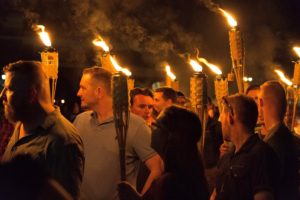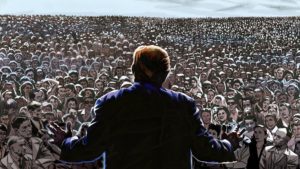Modern Politics
Jan 2nd, 2018 by amcadams
PART I
I shall devote the first section of our course to defining the character of the Modern Nation-State and the one particular manifestation of this state that we know best: Liberal Democracy. I will begin by drawing a connection between two qualities we all share in common: “modernity” and “liberalism.” At this early point in the semester, we will deal with several abstract concepts. In coming weeks when we consider the origins and evolution of the forms of organization behind these concepts, these abstractions will become real for you.
My personal guarantee: By the end of this course, you will see how my abstractions fit together into one neat and tidy, dynamic story. First, we need to agree about the meaning of the terms we use.
1. LECTURE: Wednesday, January 17
Reflections on the evolution of political institutions: The making of the Modern Nation-State and the indeterminate nature of human history.
Today’s Assumption: The Modern Nation-State is distinguished by its capacity to bring together different peoples and contending identities. This state form represents a novel way of organizing human beings. To be clear, not all states are Nation-States. And, not all peoples want to live together. Sometimes, human differences get in the way of human commonalities, especially in politics. Just look at the disastrous consequences of our experiments in nation-building in Afghanistan and Iraq.

Gould’s Theory of Punctuated Equilibrium
Assignment: Watch the video below and reflect upon the issue of historical change which I address in today’s class. Also, look ahead to your Friday discussion section.
NOTE: You have reading assignments and a short essay that you must turn in at the beginning of your section.
The nature of historical change as seen by a paleontologist. Stephen Jay Gould talks about the approach to studying fundamental change that I find totally convincing—the theory of evolution. Watch at least the first 6 minutes of this stimulating video: LISTEN As you listen to Gould, ask yourself how his arguments about both human evolution, “punctuated equilibrium” (what does this concept mean?), and the extinction of dinosaurs can be applied to the evolution of political ideas and institutions.
2. DISCUSSION SECTION: Friday, January 19
American Democracy in Crisis: What does it mean to be a real American?”
How do we decide who belongs in the United States? How do we decide who does not? Assuming you are an American citizen, how did you acquire this title?
Trigger Warning for Liberals! Many of these readings come from conservative sites and/or conservative writers:
Primary Reading: Samuel Huntington, “The Hispanic Challenge” (Foreign Policy): PRINT AND READ
Huntington was a preeminent political scientist. Note his incredible prediction on 14.
Emma Lazarus, “The New Colossus,” a plaque on America’s Statue of Liberty: PRINT AND READ
See the original HERE
Bruce Springsteen, “American Land” PRINT AND READ
Edward Hudgins, “What is an American?” (the libertarian Cato Institute) PRINT AND READ
“Husband of Trump Supporter Deported to Mexico” (the Alt-Right Breitbart News) PRINT AND READ
Christopher Manion, “The Catholic Bishops and Immigration Reform” (the traditionalist Catholic Crisis Magazine): PRINT AND READ
“New York Police Officers Rally in support of Colin Kaepernick” PRINT AND READ

Colin Kaepernick (right) cannot find a job, but Blain Gabbert (left) can
What is an American Car? READ Why am I asking you to read this article?
Consider this contrasting policy: Israili Law declares the country the ‘nation state of the Jewish people'”: READ AND PRINT
Assignment: Write a one-paragraph (no more!) response to the following question: In your opinion, what is the single, most important requirement for being a “true American.” You may only choose one requirement. The point of your paragraph should be to identify this requirement and persuade the reader why it is the single, most important factor.
Your paragraph should be typed and double-spaced (12 point). We will use this format for discussion-section paragraphs throughout the semester. Make sure you bring your paragraphs to your discussion. Your TAs will ask you to send them your paragraphs by 6:00 on the Thursdays preceding this and every other discussion section.
There is also a deliberate mistake on our syllabus. Identify the location of the mistake at the bottom of the paragraph page you turn in.
3. LECTURE: Monday, January 22
Reflections on what it means for citizens of the United States to live in modern times.
Today’s Assumption: We are all Modern. By this statement, I mean that we share conceptions of truth and ideas about how to organize our lives which differ fundamentally from those held by other societies in the world.
Jen Christensen, “The Most Accurate Clock in the World is Redefining the Second” READ What can a clock tell you about modern society?
Ray Bradbury, Fahrenheit 451. Start reading this book now and finish it as soon as possible. What would it be like to live in a world where humans were prevented from seeking truth through facts?
Oprah Winfrey on pursuing the truth: READ
How much should we be protected from books? The Germans have a constitutionally-informed ban on the publication of Mein Kampf, but should we discourage the distribution of books? READ
An essential part of being modern is agreement on facts. As a result of our capacity to reason, we pursue the truth through the scientific method (even though we don’t always recognize that this is what we are doing). The acceptance of a factual claim (e.g., a heliocentric model of our solar system) does not prevent one from holding a religious faith (e.g., the existence of God). The believer’s faith in God may be just as true as factual knowledge, but for most scientists, the claim is not empirically verifiable. Throughout much of its history, the Catholic Church has maintained that there is no contradiction between the acceptance of factual knowledge (reason) and faith—they are simply different forms of knowing.
4. LECTURE: Wednesday, January 24
Reflections on a political invention, the Liberal Nation-state. Liberalism is a specific way in which human beings have organized their relations in modern times. However, it is not the only expression of modern politics. As we shall see later, Fascism and Leninism are also forms of modern politics.
Abraham Lincoln invents the liberal nation-state: READ
Today’s Assumption: We are all Liberals. (Sorry, Ted Cruz, Rand Paul, and Paul Ryan, but it’s true.) However, this is no cause for alarm for political conservatives. In making this claim, I do not mean that we are “liberals” in terms of our political affiliation. Rather, I am referring to classical Liberalism, a conception of political order that was invented–not discovered–by people like Adam Smith and John Stuart Mill.
Assignment: Read Chapter II, “Of the Liberty of Thought and Discussion,” in John Stuart Mill, On Liberty (1869): PRINT AND READ
Then, listen to musician Frank Zappa talk about freedom of speech HERE Do you agree with Mr. Zappa? If not, where do we draw the line on what constitutes free speech in a Liberal society? Or should there be a dividing line at all?
The Nazis march on Charlottesville:
Anthony Romero, ACLU Executive Director, “Equality, Justice and the First Amendment” PRINT AND READ
K-Sue Park, “The ACLU needs to rethink Free Speech” PRINT AND READ
Not at all a new issue: “Swastika war’ in Skokie” READ
5. DISCUSSION SECTION: Friday, January 26
American Democracy in Crisis: Part II Should there be a limit to the exercise of free speech in a democracy?
One-Paragraph Assignment: Is there something about the exercise of free speech by Nazis that makes it deplorable and in tolerable in a democracy, whereas anti-Nazi protest is defensible?
For this assignment, I do not want you to focus on what steps should be taken to prevent the exercise of free speech from threatening public order. That is a question of policy. Reasonable people can differ about how one should prevent violence. Rather, please think about the broader question: What kinds of speech are acceptable–or unacceptable–in a free, liberal-democratic society.
